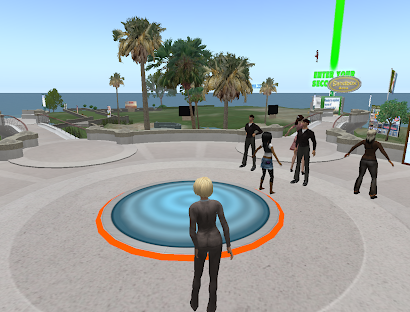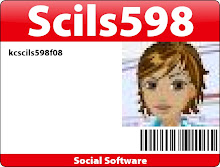Screenshot InWorld

chess screencast
Monday, December 22, 2008
If I were Steve...
I found this course to be one of the most interesting one in the whole MLIS curriculum. For me, it was a very quick introduction to several technologies and related modes of communication which a librarian may use. I am now very comfortable with activities like blog writing and podcasting which until now, I regarded with a combination of awe and mystery. In isolation, I think, each one of these techniques are not very important and likely to be superseded by a better mousetrap next semester. However, the overall shift in paradigm (as far as libraries are concerned) which they represent is quite amazing. It will not surprise me at all if the content of the course is very different next semster from what it is today. If I were to teach this course, I will probably change the emphasis given to certain componets. For example, I found blogs and podcasting very interesting. On the other hand, I am not sure about the real purpose of twitter. But this is only a personal opinion. The course is great as is and leaves little to be desired.
Thursday, December 11, 2008
My experience with Second Life
The experience of visiting Second life was very unusual. It was like nothing else I had experienced in my life. At first I visited a place where I met a lot of people. I then selected "education" and found myself in the Princeton University Campus. However, after walking about for a while, I was completely lost. I found myself in never never land with no human contact. Fortunately, there was a red arrow which navigated me back to civilization, but not before I had had two nasty falls in two lakes and had to rescue myself by flying onto a bridge. After returning to the campus, I entered a building (Dean's Office). I promptly walked out of the building and saw another student at the entrance. However, as soon as she noticed me, she broke into a sprint and was gone in no time. At the end of my visit to Princeton, I met two cute squirrels.
Tuesday, December 9, 2008
"Everything bad is good for you" and Libraries
If internet, television, blogging, gaming and everything else that is "bad" is actually good for you, libraries can use these media to bring their community of users together. Libraries, which, in every respect, are centers for communication and exchange of ideas, can, with the help of blogs, gaming and internet, serve as forums for the expression of thoughts and opinions. By introducing gaming, libraries can draw teenagers and serve as social meeting places.
It appears as though the author of "Everything bad is good for you" is trying to make his point by means of posing as a devils advocate. At first blush, the use of the internet and gaming seem unproductive. However, a closer examination brings forth their redeeming aspects. I get a sense that Johnson is not fully convinced (espcially in light of his previous work on the negative aspects of television, internet etc) of the absolute goodness of the internet, TV etc as media. However, this book tries to blunt the criticism by means of a contrapuntal argument.
It appears as though the author of "Everything bad is good for you" is trying to make his point by means of posing as a devils advocate. At first blush, the use of the internet and gaming seem unproductive. However, a closer examination brings forth their redeeming aspects. I get a sense that Johnson is not fully convinced (espcially in light of his previous work on the negative aspects of television, internet etc) of the absolute goodness of the internet, TV etc as media. However, this book tries to blunt the criticism by means of a contrapuntal argument.
Wednesday, December 3, 2008
Best practices for Screencasting
Screencasting is useful only for demonstrating computer applications or elaborating on a specific aspect of computer software. When making a screencast it is helpful to:
-manage time and be brief.
-keep in mind that spoken words are as important as display actions.
- make sure that the resolution is adequate and the screencast is clear
-make sure that the screencast is well-scripted for effective teaching/learning to take place.
-manage time and be brief.
-keep in mind that spoken words are as important as display actions.
- make sure that the resolution is adequate and the screencast is clear
-make sure that the screencast is well-scripted for effective teaching/learning to take place.
Which Console for You?
With a teenager in our house, gaming is a very sensitive subject. While it can be a loads of fun, it can turn into an avenue to waste a lot of time in a completely unrewarding manner. A gaming system can be potetially used as a simulator that trains the user for real world situation such as flying a plane or driving a car, but the law of diminishing returns kicks in very quickly.
The biggest question to answer while choosing a gaming system is whether you want to opt for a dedicated system such as Nintendo, Wii PS3 or thier ilk or you want to go for a powerful PC with all the necessary bells and whistles. The advntage of a dedicated system is superior performance for the given task and availability of popular software specifically designed for a certain platform. The advantage of a gaming computer is better performance for a given price and ability to use the same system to run payrolls (or anything you may want to do with it) when not being used for playing games. Upgrade cost of a gaming computer is likely to be smaller than the cost associated with a dedicated gaming console.
As a dedicated system, I would prefer PS3. It has excellent graphics, a variety of games spanning different genres. The feature which I like the best is its ability to connect to internet to allow you to play multiplayer games with complete strangers. The system comes with a reasonably large hard drive which let it becom a part of a LAN.
Among PC games, my favorites are Flight Simulator, SimCity and Chess. These games go way beyond fine-tuning your motor skills; they actually make you think about the real world situations. Flight simulator teaches you a lot about flying planes without jeopardizing an actual plane or real living people. SimCity is a simulator for real world that trains you for decision making. Internet chess allows you to hone your skills by playing against people with different playing styles and temperaments.
The biggest question to answer while choosing a gaming system is whether you want to opt for a dedicated system such as Nintendo, Wii PS3 or thier ilk or you want to go for a powerful PC with all the necessary bells and whistles. The advntage of a dedicated system is superior performance for the given task and availability of popular software specifically designed for a certain platform. The advantage of a gaming computer is better performance for a given price and ability to use the same system to run payrolls (or anything you may want to do with it) when not being used for playing games. Upgrade cost of a gaming computer is likely to be smaller than the cost associated with a dedicated gaming console.
As a dedicated system, I would prefer PS3. It has excellent graphics, a variety of games spanning different genres. The feature which I like the best is its ability to connect to internet to allow you to play multiplayer games with complete strangers. The system comes with a reasonably large hard drive which let it becom a part of a LAN.
Among PC games, my favorites are Flight Simulator, SimCity and Chess. These games go way beyond fine-tuning your motor skills; they actually make you think about the real world situations. Flight simulator teaches you a lot about flying planes without jeopardizing an actual plane or real living people. SimCity is a simulator for real world that trains you for decision making. Internet chess allows you to hone your skills by playing against people with different playing styles and temperaments.
Tuesday, December 2, 2008
Johnson and "Everthing Bad is Good..."
Johnson, in his book "Everything Bad is Good for you...", argues that ostensibly "bad" habits such as video gaming may actually be "good" for you. In corroboration, he asserts that TV shows are getting smarter and video games sharpen certain skills such as hand-eye-coordination and motor skills.
I find the whole argument rather specious. After all, if video gaming was such a useful skill, they would have taught it as a subject in schools. The problem is that the skills that your are taught by video games are not general enough to be useful in other walks of life. Moreover, TV shows and video games shorten your attention span and weaken your ability to think in abstract.
Typically, valuable skills are those which are sufficiently general to be useful to solve a broad class of problems. Therefore, video games may be challanging to master, they have a diminishing marginal utility in relation to the time spent.
I find the whole argument rather specious. After all, if video gaming was such a useful skill, they would have taught it as a subject in schools. The problem is that the skills that your are taught by video games are not general enough to be useful in other walks of life. Moreover, TV shows and video games shorten your attention span and weaken your ability to think in abstract.
Typically, valuable skills are those which are sufficiently general to be useful to solve a broad class of problems. Therefore, video games may be challanging to master, they have a diminishing marginal utility in relation to the time spent.
Friday, November 21, 2008
Subscribe to:
Posts (Atom)
